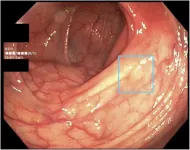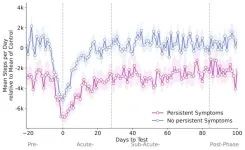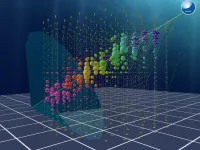A simple way to control superconductivity
2025-03-20
(Press-News.org)
Scientists from the RIKEN Center for Emergent Matter Science (CEMS) and collaborators have discovered a groundbreaking way to control superconductivity—an essential phenomenon for developing more energy-efficient technologies and quantum computing—by simply twisting atomically thin layers within a layered device. By adjusting the twist angle, they were able to finely tune the “superconducting gap,” which plays a key role in the behavior of these materials. The research was published in Nature Physics.
The superconducting gap is the energy threshold required to break apart Cooper pairs—bound electron pairs that enable superconductivity at low temperatures. Having a larger gap allows superconductivity to persist at higher, more accessible temperatures, and tuning the gap is also important for optimizing Cooper pair behavior at the nanoscale, contributing to the high functionality of quantum devices.
To date, efforts to control the superconducting gap have largely focused on “real space,” in the physical position of particles. However, achieving control in momentum space, —a different mapping that shows the energy state of the system—has remained elusive. Fine-tuning the gap in momentum space is crucial for the next generation of superconductors and quantum devices.
In an effort to achieve this, the group began working with ultrathin layers of niobium diselenide, a well-known superconductor, deposited on a graphene substrate. Using advanced imaging and fabrication techniques, such as spectroscopic-imaging scanning tunnelling microscopy and molecular beam epitaxy, they precisely adjusted the twist angle of the layers. This modification produced measurable changes in the superconducting gap within momentum space, unlocking a novel “knob” for precisely tuning superconducting properties.
According to Masahiro Naritsuka of CEMS, the first author of the paper, “Our findings demonstrate that twisting provides a precise control mechanism for superconductivity by selectively suppressing the superconducting gap in targeted momentum regions. One surprising discovery was the emergence of flower-like modulation patterns within the superconducting gap that do not align with the crystallographic axes of either material. This underscores the unique role of twisting in shaping superconducting properties.”
Tetsuo Hanaguri of CEMS, the last author, added, “In the short term, our research deepens the understanding of superconducting systems and inter-layer interactions, advancing the design of superconductors with tailored properties. In the long term, it lays the foundation for developing energy-efficient technologies, quantum computing, and beyond. Next steps involve investigating whether magnetic layers can be integrated into the structure to enable both spin and momentum selectivity. These advances could unlock new research opportunities and pave the way for developing innovative materials and devices.”
END
ELSE PRESS RELEASES FROM THIS DATE:
2025-03-20
New Haven, Conn. — Advances in the gene-editing technology known as CRISPR-Cas9 over the past 15 years have yielded important new insights into the roles that specific genes play in many diseases. But to date this technology — which allows scientists to use a “guide” RNA to modify DNA sequences and evaluate the effects — is able to target, delete, replace, or modify only single gene sequences with a single guide RNA and has limited ability to assess multiple genetic changes simultaneously.
Now, however, Yale scientists have developed a series of sophisticated mouse models using CRISPR (“clustered regularly ...
2025-03-20
The American Gastroenterological Association (AGA) released a new clinical guideline making no recommendation — for or against — the use of computer-aided detection systems (CADe) in colonoscopy. A rigorous review of evidence showed that artificial intelligence-assisted technology helps identify colorectal polyps. However, its impact on preventing colorectal cancer — the third most common cancer worldwide — remains unclear.
Colonoscopy, performed more than 15 million times annually in the U.S., is an effective tool for detecting and preventing colorectal cancer. CADe systems have been shown to improve polyp detection ...
2025-03-20
For the first time scientists have identified promising drug candidates that bind irreversibly with a notoriously “undruggable” cancer protein target, permanently blocking it.
Transcription factors are proteins that act as ‘master switches’ of gene activity and play a key role in cancer development. Attempts over the years to design “small molecule” drugs that block them have been largely unsuccessful, so in recent years scientists have explored using peptides – small protein fragments – to block these “undruggable” targets.
Now researchers from the University of Bath have for ...
2025-03-20
[Vienna, 19.03.2025]—Between April 2020 and December 2022, over 535,000 people in Germany downloaded and activated the Corona Data Donation App (CDA). Of these, more than 120,000 voluntarily shared daily data from their smartwatches and fitness trackers with researchers, providing insights into vital functions such as resting heart rate and step count.
“These high-resolution data served as the starting point for our study,” explains CSH researcher Katharina Ledebur. “We were able to compare vital signs in 15-minute intervals before, during, and after a SARS-CoV-2 infection.”
Higher Resting Heart Rate ...
2025-03-20
Imagine looking at the world through the stalked compound eyes of krill in the Southern Ocean. All of a sudden, a penguin appears like a voracious giant, streamlined like a torpedo, chasing and consuming thousands of krill at rapid speed.
Now, researchers have shown that the water-borne smell of the poo of these flightless birds is enough to cause the krill to show escape behaviors.
“Here we show for the first time that a small amount of penguin guano causes a sudden change in the feeding and swimming behaviors of Antarctic krill,” said Dr Nicole ...
2025-03-20
Quantum gravity is the missing link between general relativity and quantum mechanics, the yet-to-be-discovered key to a unified theory capable of explaining both the infinitely large and the infinitely small. The solution to this puzzle might lie in the humble neutrino, an elementary particle with no electric charge and almost invisible, as it rarely interacts with matter, passing through everything on our planet without consequences.
For this very reason, neutrinos are difficult to detect. However, in rare cases, ...
2025-03-20
The parts of the brain that are needed to remember words, and how these are affected by a common form of epilepsy, have been identified by a team of neurologists and neurosurgeons at UCL.
The new study, published in Brain Communications, found that shrinkage in the front and side of the brain (prefrontal, temporal and cingulate cortices, and the hippocampus) was linked to difficulty remembering words.
The new discovery highlights how the network that is involved in creating and storing word memories is dispersed throughout the brain.
This is particularly crucial for helping to understand conditions such as epilepsy, in which patients may have difficulty with remembering words. ...
2025-03-20
An experimental drug appears to reduce the risk of Alzheimer’s-related dementia in people destined to develop the disease in their 30s, 40s or 50s, according to the results of a study led by the Knight Family Dominantly Inherited Alzheimer Network-Trials Unit (DIAN-TU), which is based at Washington University School of Medicine in St. Louis. The findings suggest – for the first time in a clinical trial – that early treatment to remove amyloid plaques from the brain many years before symptoms arise can delay the onset of Alzheimer’s dementia.
The study is published March 19 in The Lancet Neurology.
The international study ...
2025-03-20
UCL Press Release
Under embargo until Thursday 20th March, 00:01 UK time / Wednesday 19th March, 20:01 Eastern US time
Not peer reviewed | Literature review & data analysis | People
People who share more mealtimes with others are more likely to report higher levels of life satisfaction and wellbeing, finds research led by a UCL academic for the World Happiness Report.
In chapter three of the report, Sharing Meals with Others, the researchers from UCL, University of Oxford, Harvard University and Gallup found that meal sharing as an indicator ...
2025-03-19
A new analysis of data collected over three years by the Dark Energy Spectroscopic Instrument (DESI) collaboration provides even stronger evidence than the group’s previous datasets that dark energy, long thought to be a “cosmological constant,” might be evolving over time in unexpected ways.
Dr. Mustapha Ishak-Boushaki, professor of physics at The University of Texas at Dallas, is co-chair of the DESI working group that interprets cosmological survey data gathered by the international collaboration, which includes more than 900 researchers ...
LAST 30 PRESS RELEASES:
[Press-News.org] A simple way to control superconductivity





